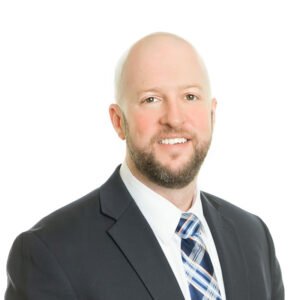On the Forefront of Prevention and Treatment: Eric Bresee and Mariah Senecal-Reilly
By Deborah Jeanne Sergeant

An early interest and educational background in psychology prepared Eric A. Bresee for his role as executive director at Farnham Family Services in Oswego. A Hannibal native, Bresee became interested in psychology during his senior year of high school when a presentation at his school about the topic intrigued him.
“I was interested in understanding how people work and that aligned with psychology,” he said.
He studied psychology at SUNY Oswego and hoped to help people someday. After graduation, he worked at Oswego County Opportunities with people with developmental disabilities. There he met someone who encouraged him to obtain his master’s degree at Oswego. He did so and in 2015, he became executive director at Farnham, where he had already served on the board for a few years.
Through his experiences on the board at Farnham, “I developed compassion for people struggling with substance use disorder,” he said. “I saw a growing need, especially with opiates. I wanted to get involved and make a difference.”
Over the years, Bresee has seen the model of care develop from one of abstinence-only to one that includes personalized, person-focused harm reduction for those who use substances.
Although challenges in his work include staffing and finding ways to help patients achieve their goals, he appreciates how his role at Farnham has helped him grow as a leader and continues to delight him as patients become healthier.
“When I see individuals getting their lives back and families relieved that their loved one is healthy again, that’s inspiring,” he said. “It makes this work very rewarding.”

Seeing a family member struggle with substance use inspired Mariah Senecal-Reilly to become interested in the field. She serves as coordinator of the Mental Health and Substance Use Initiatives Program for Onondaga County Health Department.
She earned a degree in social work with a psychology minor from LeMoyne College and her master’s in public administration from Syracuse University. She initially worked for Oswego County as a program coordinator in 2014 but changed jobs three years later to work in Onondaga County for a shorter commute.
“We have made a great deal of progress in stigma reduction from when I started to now,” Senecal-Reilly said. “Now the public is more aware as is society. We are more accepting.”
But other changes are not so happy.
“We have been heavily impacted by overdose fatalities,” she said. “I’m hopeful we’re turning it around. That’s been hard.”
Her program has grown over the past year with new positions. Since she began at Onondaga County, she has helped develop strategies such as syringe exchange to reduce harm, providing naloxone to counteract opioid overdose and Dual Diagnosis Treatment Solutions to substance use.
“It’s unique to be developing the program,” she said.
Although most people doing this kind of work develop empathy for those they serve, Senecal-Reilly’s work feels very personal.
“I think of everything I do could affect my family member who uses,” Senecal-Reilly said. “It’s easy for me to think of everyone we serve as someone’s family member. Having that connection makes it more than a job for me.”

